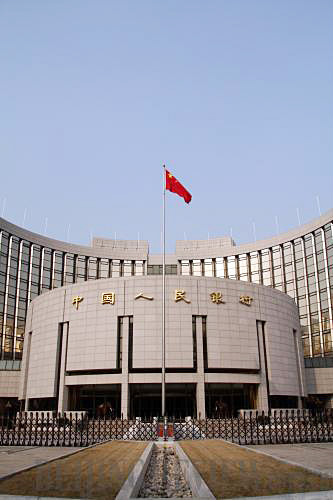|
 |
|
FINANCIAL CENTER: Pictured is the headquarters of the People's Bank of China, the country's central bank. PBC officials recently outlined policy issues and financial challenges China will face in the coming years (YANG SHIYAO) |
During the Fourth Session of the 11th National People's Congress, the People's Bank of China (PBC), the central bank, held a press conference on March 11. Central bank Governor Zhou Xiaochuan and three deputy governors answered questions on the country's monetary policies and financial issues. Edited excerpts of their answers follow:
Inflation expectation
Zhou Xiaochuan: In China, CPI figures are calculated on a yearly and monthly basis. Year-on-year figures are often quoted, but such figures are influenced by the base number from the previous year. In general, the base numbers are stable, but during the financial crisis, the base numbers were unstable. Therefore, when judging year-on-year figures, we should consider the influence of these base numbers.
Consideration must also be given to the influence of festivals, particularly the Spring Festival, or the Chinese Lunar New Year, which comes in January or February. The Spring Festival imposes marked influences on consumption and prices. After considering these factors, we can judge whether inflation expectations are increasing, decreasing or remaining stable.
Policy adjustments
Zhou: Monetary policies have multiple targets, including maintaining stable price levels, reasonable economic growth, high employment and balance for international payment.
However, it takes several months or up to one year or more to see the effects after a monetary policy is released.
Therefore, we have also introduced some intermediate variables, such as narrow money, broad money and money in circulation.
Recently, besides the aggregate volume of loans, we have also been observing the total financing volume because many intermediate variables can reflect the demand of monetary policies from the overall economy.
There are several tools for implementing monetary policies.
We can open market operations, deposit reserve rate, interest rate, exchange rate and some other ways.
Monetary policies should be coordinated with fiscal policies and other policies, but it's hard to say what factors will lead to interest rate adjustment and how much the adjustment will be.
After the Chinese economy successfully recovered from the global financial crisis, inflation has been on the rise. Under these circumstances, the interest rate is certainly an important tool to use. However, any tool of financial policies is likely to have an adverse impact, such as increased capital inflows.
But since China has yet to fully open its capital account, the government still has some ways to manage the capital flows. Some countries have no control over the capital account, but when deciding monetary policies, the government still needs to weigh its gains and losses. At present, the interest rate policy is still a major tool.
As for the exchange rate, China has a large economy with a massive population, and therefore any adjustment in the exchange rate will impose some influence on domestic prices. Among the policy tools to cope with inflation, the exchange rate should not be a focus, because there are several factors to consider. We will continue to advance the reform of the exchange rate step by step and enhance the flexibility of the exchange rate.
Yuan settlement
Hu Xiaolian: Yuan settlement in cross-border trade experienced rapid development in 2010. China's currency, the renminbi, is more widely used in cross-border trade, financing of overseas projects, overseas direct investment and foreign direct investment. This kind of development conforms to the market demand.
Development of yuan settlement in cross-border trade needs some conditions, including full convertibility of the yuan under the capital account. And while this is an important condition, it's not an absolutely necessary one. Convertibility of the yuan under the capital account is still in progress in China, and full convertibility has yet to be completed.
Convertibility is our target and needs to be advanced. On the other hand, we believe market demand of yuan settlement in cross-border trade will grow, so the convertibility and cross-border use can promote each other. We think that when convertibility is improved it will help expand yuan settlement in cross-border trade. We also think that further development of the yuan settlement in cross-border trade will promote convertibility under the capital account.
Various aspects contribute to progress being made in the convertibility process.
| 